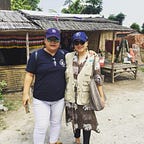Always on the go!
Meet Rabindra — WFP’s award winning driver in Nepal
If you are looking for Rabindra Khadka, chances are he’ll have his feet on the pedals, hands on the steering wheel and mind on the road ahead in some of the most isolated parts of Nepal.
As a driver for the World Food Programme for more than 20 years, he has braved conflicts, earthquakes and driven through the mighty Himalayas to help his colleagues to reach some of Nepal’s most vulnerable families. Driving here isn’t easy and takes passion, skill and precision.
Meet the man behind the wheel and why he’s competing to be crowned WFP’s best driver in Southeast Asia.
Driving into conflicts and natural disasters
Rabindra has worked in all kinds of emergencies — in the middle of the Maoist insurgency, and during the 2008 floods in the Southern belt of the country and the 2015 earthquakes. He has also driven during political protests where driving vehicles poses danger.
“I have driven our staff through life-threatening situations and escaped a near-death experience. This is the nature of our work. WFP works in the most isolated and remote parts of the country,” Rabindra said.
In 2009, while driving through the windy mountainous terrain from Darchula District to Dadeldhura in Far Western Nepal, Rabindra and two other staff (Chandra Thapa and Gyanendra Singh) were caught by surprise.
“I saw a landslide starting to build up from a distance, I knew we had to pass it or else it could could kill us. I used my instinct and drove quickly before the landslide hit the road. We were lucky to cross it within few seconds and still be alive,” says Rabindra.
Natural disasters and conflicts are two of the leading causes of hunger in Nepal. Rabindra has experienced both while working for WFP.
During the insurgency, Rabindra and two colleagues (Kanta Khanal and Tara Singh) were stopped by Maoists in Sindupalchowk district and were asked for a ransom in exchange for their freedom.
“At that time, both Kanta and myself had newborn children and we really feared for our lives. After keeping us hostage for eight hours they finally let us go,” he recalls.
As the only male accompanying two female staff, Rabindra used his negotiating skills to ensure that all three of them came out unharmed and were able to return home to their families.
After the earthquakes struck
The devastating earthquakes in 2015 mobilised the humanitarian community in Nepal, and Rabindra still has strong memories of the days immediately after the earthquakes hit.
“I had picked up a colleague from the airport and was stuck in traffic on a bridge when everything started to shake. Motorcycles were falling and everyone was running away from their vehicles, I made Enya hold onto the railing of the bridge until the aftershocks stopped,” he says.
“Soon after that we drove to the office, I dropped her there and I was already deployed for rescue operations, where we worked until 9pm the first night,” he adds.
Taking the road less traveled
Whether driving through rivers, across the flat plains of the Terai or through the snowy Himalayas, safety and security are Rabindra’s main priorities.
“I must be aware of the surroundings, cautious, and — when necessary — diplomatic. Wherever we go and during all the trips I have, the safety of the people that I drive is at the centre of my role. I follow the security rules and always ensure that everyone has their seat belts on, before we go on.”
Drivers like Rabindra play a key role in supporting WFP to access families who are most in need in Nepal and across the world.
“Drivers are the back bone for any operation; we transport relief materials and we facilitate movement for all kinds of purposes,” he said.
“WFP has many staff members that come from different backgrounds. When I drive, I get to meet people and learn about new cultures. Driving has become my passion, especially off-road driving because I get to see the breath-taking landscape of Nepal.”
Looking Forward
It’s less than a week before Rabindra flies to Thailand on his first ever international trip. He’ll be competing in the Southeast Asia Driver Recognition Programme in Pattaya, Thailand.
This is an inter-agency competition, facilitated by Fleet Forum, which recognizes the important role played by drivers. Drivers from eight organizations (WFP, UNICEF, WHO, UNFPA, World Bank, Save the Children, CRS and Mercy Corps) will be assessed on their knowledge and skills based on road safety, fuel efficiency, and their ability to use vehicles in challenging conditions. The main objective of this competition is to engage, educate, inspire and recognize the best drivers for their contribution.
“After all these years of hard work, I consider myself lucky to be declared the best driver, but to be able to participate in an event like this, I had never heard of such a competition before,” says Rabindra.
Read more about WFP’s work in Nepal.
